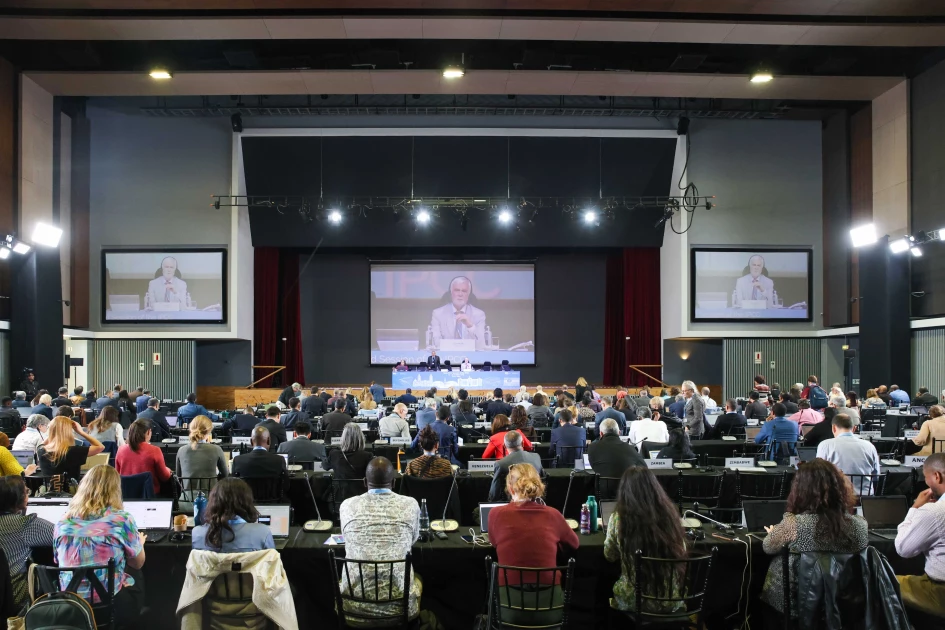The world not ready for a sustainable, climate-neutral economy - Report

An Intergovernmental Panel on Climate Change forum

Audio By Vocalize
Experts have advised on the need for a common-ground transition into a sustainable, net-zero future, one that encompasses a shift to a climate-neutral economy while ensuring the process is fair and inclusive, especially for people and communities most affected by the transition.
If pursued without being clouded by the financial politics between the Global North and Global South, the transition offers myriad opportunities, a systemic change that can uplift all communities and workers within a country.
However, a worrying new report by ActionAid reveals that so far, only 2.8% of multilateral climate finance for mitigation has gone towards supporting just transitions - a mere US$630 million over more than a decade - for approaches meant to prioritize workers, women, and communities in tackling the climate crisis.
The report further dissects that only one dollar in every 35 spent on climate action supports just transition approaches, pointing to how these efforts remain shockingly underfunded.
It elaborates that less than 1 in 50 projects (1.9%) supported by the Green Climate Fund (GCF) and the Climate Investment Funds (CIF) were found to adequately listen to and support workers, women, and communities through a just transition. Almost all just transition projects were funded through the GCF, where fewer than one in 18 projects (10 out of 178, or just 5.6%) met the just transition criteria. Only two CIF projects out of 466 (0.4%) were found to support just transition efforts.
The concept of a just transition gained global traction in climate change policy discussions in 2009 at the Copenhagen Summit, when it was first incorporated into the negotiating text. It was later included in the preamble to the historic Paris Agreement adopted in December 2015.
These efforts underscore the interconnection between the environment and employment, promoting the link to the Sustainable Development Goals (SDGs). The just transition narrative integrates social, economic, and environmental development in a unified approach.
Teresa Anderson, author of ActionAid’s 3rd Annual How the Finance Flows report and Global Lead on Climate Justice, said:
“No one should have to choose between a secure job and a safe planet. Just transition approaches ensure that climate action prioritizes people’s daily needs and doesn’t accidentally push them deeper into poverty. Without just transition approaches, climate action risks unintended harm, backlash, and ever-more delay.”
The report also highlights stories of harm caused by industrial agriculture companies and fossil fuel giants in communities across the Global South, alongside stories of resilience - where people and workers are fighting back against climate destruction and deforestation. It identifies key sectors that must play a role in building a greener future but are currently failing to protect workers and communities.
According to Jessica Siviero, Climate Justice Specialist at ActionAid Brazil:
“The Amazon Forest acts as the lungs of planet Earth, while the Cerrado serves as its veins, carrying life and connecting vital ecosystems. With COP30 coming to Belém, the spotlight is on industrial agriculture’s role in driving the destruction of the Amazon and Cerrado. It’s time for the world to move away from harmful industrial agriculture and towards agroecological approaches that feed people and cool the planet. Just transition approaches must also be applied to agriculture.”
With just a few days to go before COP30 begins in Belém, Brazil, there is a growing call for a commitment to coordinate just transition efforts globally. Stakeholders are demanding the establishment of a “Belém Action Mechanism” on just transition to ensure coordination, shared learning, and support for implementation.
“This is a critical opportunity for global climate action to evolve for the better. COP30 needs to deliver on a global plan for just transition — to support and reassure those on the frontlines and to unleash the action our planet so urgently needs,” adds Anderson.
Climate change stakeholders maintain that current climate finance flows are failing to address the need for a just transition in climate action, as they do not sufficiently prioritize people’s participation, rights, or livelihoods.


Leave a Comment